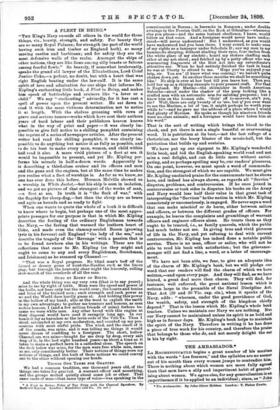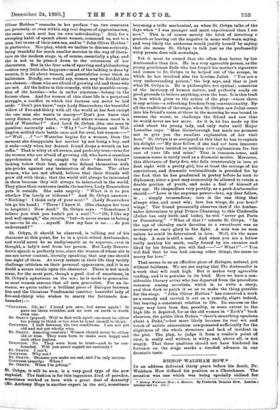THE AMBASSADOR.*
La ROCHEFOUCIIILD begins a great number of his maxims with the words "Lee femmes," and the syllables are no sooner out of his mouth than every woman jumps to contradiot him. There is nothing about which women are more fully agreed than that men have a silly and impertinent habit of general- ising about women. We agree also, for any generalisation is an impertinence if it be applied to an individual ; since, as ‘' John • The Ambassador. By John Oliver Hobbes. London: T. Fisher Ernwhi. Oliver Hobbes" remarks in her preface, "no two creatures are precisely, or even within any real degree of approximation, the same : each soul has its own individuality." Still, for a sweeping habit of speech about women, commend us, not to a man, but to one of their own sex, and to "John Oliver Hobbes" in particular. Her play, which we incline to discuss seriously, being thankful for much smaller mercies in the way of litera- ture on the modern stage, is, of course, essentially a play, and she is not to be pinned down to the utterances of her characters. But in the four acts of sparring and philandering --since very little else happens—most of the talking is done by women, it is all about women, and generalities come thick as hailstones. Briefly, one would say, women may be divided into two classes,—those who are afraid of growing old and those who are not. All the ladies in this comedy, with the possible excep- tion of the heroine—who is under nineteen—belong to the former class. And for women of this class life is a perpetual struggle, a conflict in which the harness can never be laid aside. "Don't you know," says Lady Beauvedere, the beautiful widow of five-and-thirty with all the world at her feet except the one man she wants to marry—" Don't you know that every dinner, every lunch, every call where women meet is a field of Waterloo F" And Lord St. Orbyn (the one man in question) naturally asks : "Why ? "—" Napoleon and Wel- lington settled their battle once and for ever, but women—" —" Well ...? "—" Waterloo begins for a woman, from the moment she disappoints her mother by not being a boy, and it ends—only when her dearest friend drops a wreath on her coffin." That is witty at all events, and probably true—true for the women who are afraid of growing old, who have a ceaseless apprehension of being caught by their "dearest friend" looking below their best, and who defend themselves with pin-pricks against any insinuation of decline. The other women, who are not afraid, believe that their friends will grow old with them-; that the world will always be interested in them because they will always be interested in the world. They place their existence inside themselves, Lady Beanvedere puts it outside. She asks angrily : "What is it to you whether I'm lovely or hideous ? " And St. Orbyn answers : " Nothing ! I think only of your soul !" (Lady Beauvedere lets go his hand.) " There ! I knew it. (She changes her tone to laughter.) How droll." St. Orbyn says : "Sometimes I believe you wish you hadn't got a soul I "—" Oh, I like my soul well enough," she retorts, "but—it never seems to belong to me—to be me. . . myself. Now my face is rte . . . do you understand ? "
St. Orbyn, it should be observed, is talking out of his character at this point, for he is a quick-witted Ambassador, and would never be so undiplomatic as to separate, even in thought, a lady's soul from her person. But Lady Beauve- dere's speech is perfectly true, since the women of whom she is one are never content, literally speaking, that any one should lose sight of them. At every instant in their life they tacitly challenge criticism on their personal appearance, and it is no doubt a severe strain upon the character. There is not much sense, for the most part, though a good deal of smartness, in St. Orbyn's aphorisms on the sex ; he is made to generalise as most women assume that all men generalise. For an in- stance, we quote rather a brilliant piece of dialogue between him and the Countess Vendramini (another beautiful lady of five-and-thirty who wishes to marry the fortunate Am- bassador) :—
" COUNTESS. Oh, no ! I loved you once, but never again ! It gave me three wrinkles, and no man on earth is worth even one.
Si'. OEBYN (piqued). Well to flirt with spirit one must be either
too young to think or too wise to trust oneself to think. Cot:gyms. I halt between the two conditions. I am not yet old and not yet wholly wise.
Si'. ORBYN. Amazing creature! Women should never be either old or wise. They were born to make men happy and each other jealous. COUNTESS. No. They were born to trust—and to be con- founded. Will you never regard me seriously ? Si'. OEBYN. I can't.
COUNTESS. Why not ? OEBYN. Because you make me sad, and I'm only serious. COUNTESS (eagerly). When ? OBBTN. When I'm joking."
St. Orbyn, it will be seen, is a very good type of the new euphuist. The fashion is for this ingenious kind of paradox, sometimes worked as here with a great deal of dexterity (Mr. Anthony Hope is another expert in the art), sometimes
becoming a trifle mechanical, as when St. Orbyn talks of the days when "I was younger and more experienced than I aus now." This is of course merely the trick of inverting a proverb or leaving out the negative in some well-worn saying, and very likely the authoress would justify herself by saying, that she means St. Orbyn to talk just as the professedly, witty person does talk nowadays.
Yet it must be owned that she often does better by her Ambassador than this. He is a very agreeable person, as the young gentleman finds who has forged his mother's signature and comes to St. Orbyn to be helped out of the scrape, in' which he has involved also the heroine Juliet. "You are a. very understanding person," the boy says, and that is just, what St. Orbyn is. He is philosophic, not cynical; conscious' of the intricacy of human nature, and perfectly ready on' good grounds to believe anything, even the best. It is this trait in him which gives to the action of the play—where there is any action—a refreshing freedom from conventionality. BT all the traditions of the stage, when St. Orbyn saw Juliet come into his friend's room at three in the morning he was bound to assume the worst, to challenge the friend and vow that he would never see her more. As it is, he has made up his. mind about the young lady, and only waits until Major Lascelles says : "Miss Gainsborough has made me promise- not to give you the smallest explanation of her visit here." St. Orbyn is so overjoyed at this that he has to explain his delight :—" My dear fellow, if she had not been innocent? she would have insisted on nothing BUT explanations for the rest of your life and mine." That is common-sense, an& common-sense is rarely used as a dramatic motive. Moreover, this dilettante of forty-five, who falls irretrievably in love at; first sight with a pretty girl, has at least the courage of hie convictions, and dramatic verisimilitude is provided for by the fact that he has graduated in poetry before he took to diplomacy, since a poet may reasonably be allowed to retain a double portion of youth, and make a fool of himself at. any age. He rhapsodises very prettily, as a poet-Ambassador should :—" Love is the supreme power—love, my dear fellow, is . . . simply tremendous; love is the one thing that. always wins, and must win; love has wings, do you hear?' wings." The friend prosaically observes that if the Ambas- sador determines to play Prince Charming to this Cinderella, (Juliet has only birth and looks), he will "never get Paris. or Petersburg." "What of that ?" retorts St. Orbyn. "In the age of chivalry one's devotion to a sweetheart was as, necessary as one's glory in the fight. A man was no maw unless he could be determined in love. Well, it's the same to-day. A man is still a man. And when you see a fellow really making his mark, really feared by his enemies ands liked by his friends, you will find—"—" What ?"—" You will find that he has had, among other things, the sense to, marry for love."
That seems to us an effective piece of dialogue, natural, yet. without baldness. We are not saying that The Ambassador ia a work that will rank high. But it makes very agreeable. reading, and it is genuine in its kind. Here we have a con- siderable literary artist who has departed from the procedure common among novelists, which is to write a story, and then dock or patch it so as to make the thing possible for the stage. "John Oliver Hobbes" has conceived a work. as a comedy and carried it out as a comedy, slight indeed,. but bearing a consistent relation to life. Its success on the stage may have been due, possibly, in some extent to the. high life it depicted, for as the old woman in " Zack's" book observes, the public likes Dukes, "there's something spacious. about a Dake,"—but more likely because its real wit and touch of satiric observation compensated sufficiently for the. slightness of the whole structure and lack of incident in. the plot. The play, to judge it from a reader's point of view, is really well written, is witty, and, above all, is not. stagey. That these qualities should not have hindered its. fortunes on the stage marks a decided advance in our dramatic taste.







































 Previous page
Previous page